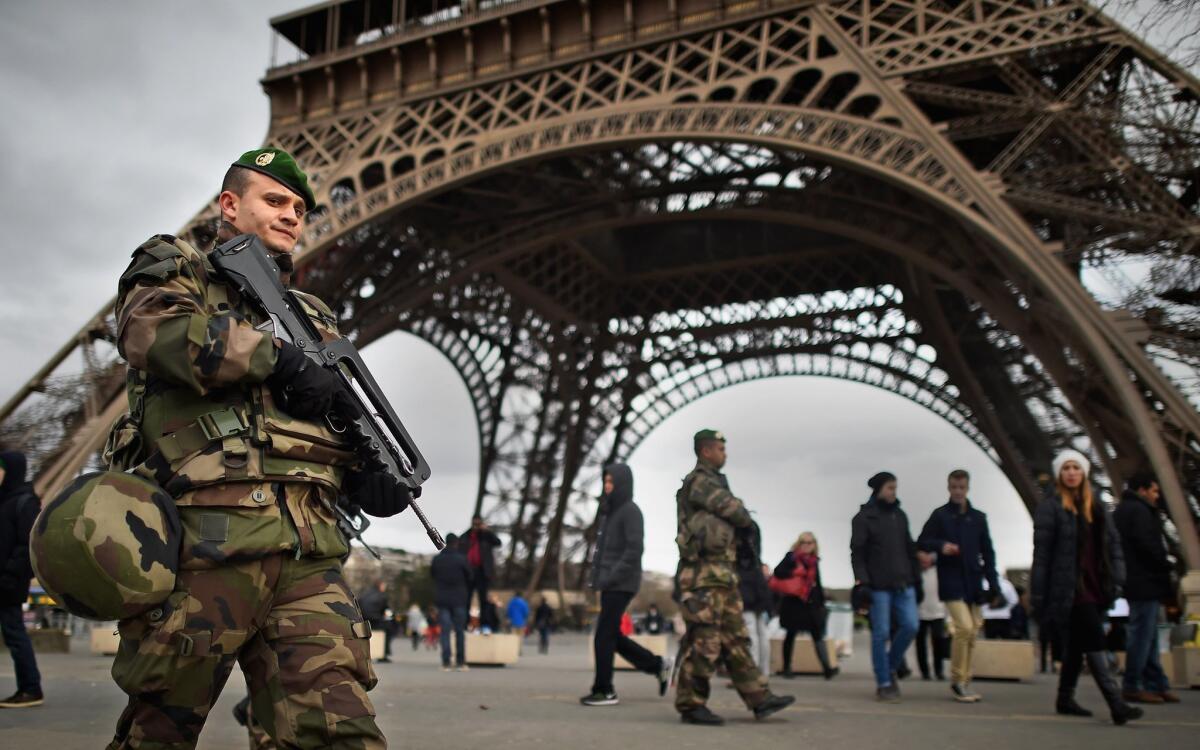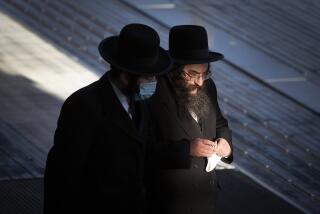France steps up security; officials suspect attackers had accomplices

Heavily armed soldiers patrolled a Jewish neighborhood and the base of the Eiffel Tower on Monday as France began the deployment of more than 10,000 troops on home soil and authorities said they believed that accomplices of the militants who launched twin attacks last week remained at large.
The sight of the military on the streets of Paris served as a reminder, as if one were needed, that the attack on the satirical publication Charlie Hebdo and a kosher market had presented the country with one of its gravest challenges since World War II.
As if to accentuate the significance of the attacks, the White House acknowledged Monday that it had blundered in not sending a higher-ranking representative to a march Sunday that drew more than 40 world leaders, including those from Britain, France and Germany.
“It’s fair to say that we should have sent someone with a higher profile to be there,” White House Press Secretary Josh Earnest said, adding that the decision to send only the U.S. ambassador to France and an assistant secretary of State should not raise doubts that the Obama administration stands “shoulder to shoulder with our allies in France.”
French Prime Minister Manuel Valls told news media that “the threat is still present” despite the killing of the two militants who gunned down 12 people at Charlie Hebdo and the attacker who left four people dead at the Jewish grocery. Valls said the three probably had accomplices, although he did not say how many or who they might be. A policewoman was also killed in an attack last week.
As many as six members of a terrorist cell involved with the Paris attacks may still be at large, the Associated Press reported Monday, citing police. News outlet RTL said authorities were seeking a fourth accomplice, in addition to the three killed. There was no confirmation from authorities of either report.
France, which has Europe’s largest Muslim population, was plunged into crisis Wednesday when the two gunmen marched into the offices of Charlie Hebdo and opened fire, wiping out much of the staff of the popular, if controversial, weekly, which had repeatedly published cartoons mocking the prophet Muhammad.
Other publications immediately offered help and money for the magazine to continue. Late Monday, Charlie Hebdo published a new edition, featuring a cover cartoon in which Muhammad, shedding a tear, holds a placard bearing the now-ubiquitous motto, “Je Suis Charlie” — I am Charlie. A headline in French reads, “All Is Forgiven.”
Authorities have thus far named one potential accomplice in the attacks: Hayat Boumeddiene, 26, a former store cashier from a Paris suburb and the girlfriend of Amedy Coulibaly, 32, who killed four of more than a dozen hostages at the kosher grocery in east Paris and may have killed the policewoman earlier.
Boumeddiene’s whereabouts have been a matter of intense speculation. On Monday, Turkish authorities confirmed that she entered Turkey on Jan. 2 and later probably traveled to Syria. That would mean she was not in France during the attacks.
Islamic militants sent Twitter messages saying that Boumeddiene had reached the “land of the caliphate,” a reference to territory controlled by Islamic State militants in Iraq and Syria, according to the SITE Intelligence Group, which monitors extremist social media.
French authorities have described Boumeddiene as armed and dangerous. She has been called “France’s most-wanted woman.”
There were reports, meanwhile, that bullet casings found at the scene of yet another shooting, that of a jogger in a Paris suburb Jan. 6, matched the gun that Coulibaly used in the Jewish grocery. However, RTL reported that the jogger, who survived, said his attacker did not resemble Coulibaly.
Coulibaly was killed Friday when police stormed the grocery store, freeing most of the hostages.
A nearly simultaneous police assault outside Paris resulted in the deaths of brothers Cherif and Said Kouachi, who carried out the attack at Charlie Hebdo. In a video that surfaced after Coulibaly’s death, a man identified as the hostage taker says he was working in tandem with the brothers.
As the attacks continued to reverberate throughout France, they also led to a controversy in the international political arena: President Obama’s critics, and his spokesman, said the White House had erred in deciding to send relatively low-ranking officials to the rally Sunday, which drew an estimated 1 million people into the streets of Paris.
Atty. Gen. Eric H. Holder Jr. traveled to Paris to attend a series of meetings with French officials on counter-terrorism but did not join the rally. The Justice Department did not say why Holder skipped the rally but noted that he attended a summit of world leaders French President Francois Hollande convened before the event.
Earnest told reporters that the White House regretted sending only the ambassador and the assistant secretary of State.
Republicans and other critics lambasted the White House for leaving the U.S. underrepresented, and allies expressed bewilderment. A widely reproduced photograph of the event showed Hollande, German Chancellor Angela Merkel, British Prime Minister David Cameron, Israeli Prime Minister Benjamin Netanyahu and Palestinian Authority President Mahmoud Abbas with arms linked in solidarity.
White House officials would not describe how they came to their decision. It was not Obama’s call, Earnest said.
He suggested security was a factor, noting that it was a massive outdoor rally organized in just a couple of days.
“I’m confident that the professionals at the Secret Service could overcome those challenges, but it would have been very difficult to do so without significantly impacting the ability of common citizens to participate in this march,” he said.
However, a Secret Service official, who asked not to be named in discussing security matters, said the agency was “never asked or notified about a trip to Paris.”
Despite the mea culpa, France defended the Obama administration. “There are absolutely no hard feelings,” Gerard Araud, France’s ambassador to the United States, said on MSNBC. “The first impression we have had is the support expressed by President Obama.”
Times staff writers McDonnell and Hennessey reported from Paris and Washington, respectively. Staff writer Paul Richter in Washington and special correspondent Christina Boyle in London contributed to this report.
Follow @mdcneville and @khennessey
More to Read
Start your day right
Sign up for Essential California for news, features and recommendations from the L.A. Times and beyond in your inbox six days a week.
You may occasionally receive promotional content from the Los Angeles Times.







